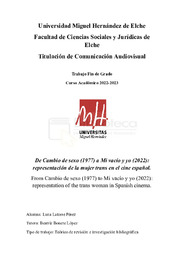Por favor, use este identificador para citar o enlazar este ítem:
https://hdl.handle.net/11000/30055
De Cambio de sexo (1977) a Mi vacío y yo (2022): representación de la mujer trans en el cine español
Título :
De Cambio de sexo (1977) a Mi vacío y yo (2022): representación de la mujer trans en el cine español |
Autor :
Latorre Pérez, Luna |
Tutor:
Bonete López, Beatriz |
Editor :
Universidad Miguel Hernández de Elche |
Departamento:
Departamentos de la UMH::Ciencias Sociales y Humanas |
Fecha de publicación:
2023-06 |
URI :
https://hdl.handle.net/11000/30055 |
Resumen :
La representación de la mujer trans en el cine español ha sido sometido a un aparente
creciente interés a causa de su importancia en cuanto a la visibilidad y la inclusión del
colectivo trans en todos los espacios. El cine como medio de comunicación es
fundamental para ofrecer una visión de mundos como el de las personas trans, que han
evolucionado desde unas primeras imágenes estereotipadas y repletas de prejuicios
hasta unas representaciones mucho más empáticas y sensibles mostrando más respeto
hacia el colectivo trans.
Se crea un trabajo en el que se observa y se estudia la representación de la mujer trans
en el cine español desde la década de los 70 con ‘Cambio de sexo’ hasta la actualidad
con ‘Mi vacío y yo’, analizando la evolución de las chicas trans protagonistas en cada
película. Tras la realización de un análisis narrativo complementado con un análisis
sobre la figura y desarrollo de las protagonistas se ha podido observarla evolución en
cuanto al tacto y la empatía en la representación de la vida trans. Se observa un tono
burlesco, estigmatizado, frívolo y casi humillante hacia la vida de una joven trans en la
primera representación de los años 70, ante una narrativa fundamentada, empática y
mucho más realista y cariñosa hacía la protagonista en la representación actual.
The representation of trans women in Spanish cinema has been subjected to growing
interest due to the importance in terms of visibility and inclusion of the trans collective.
Cinema as a means of communication is essential to offer a vision of worlds like that of
trans people, who have evolved from initial stereotyped images full of prejudices to
much more empathetic and sensitive representations showing more respect towards
trans women.
A work is created in which the representation of trans women in Spanish cinema from
the 1970s with 'Cambio de sexo' to the present day with 'Mi vacío y yo' is observed and
studied, analysing the evolution of the trans women protagonists in each film. After carrying out a narrative analysis complemented with an analysis of the figure and
development of the protagonists, it has been possible to observe the evolution in terms
of tact and empathy in the representation of trans life. A burlesque, stigmatised,
frivolous and almost humiliating tone towards the life of a young trans woman can be
observed in the first representation of the 70s, in contrast to a well-founded, empathetic
and much more realistic and affectionate narrative towards the protagonist in the current
representation.
|
Palabras clave/Materias:
mujeres trans
cine español
estigmas
prejuicios
representación
trans women
Spanish cinema
stigmas
prejudices
representation |
Área de conocimiento :
CDU: Bellas artes: Diversiones. Espectáculos. Cine. Teatro. Danza. Juegos.Deportes |
Tipo de documento :
info:eu-repo/semantics/bachelorThesis |
Derechos de acceso:
info:eu-repo/semantics/openAccess
Attribution-NonCommercial-NoDerivatives 4.0 Internacional |
Aparece en las colecciones:
TFG - Doble Grado en Comunicación Audiovisual y Periodismo
|
 La licencia se describe como: Atribución-NonComercial-NoDerivada 4.0 Internacional.
La licencia se describe como: Atribución-NonComercial-NoDerivada 4.0 Internacional.
 La licencia se describe como: Atribución-NonComercial-NoDerivada 4.0 Internacional.
La licencia se describe como: Atribución-NonComercial-NoDerivada 4.0 Internacional.
.png)
